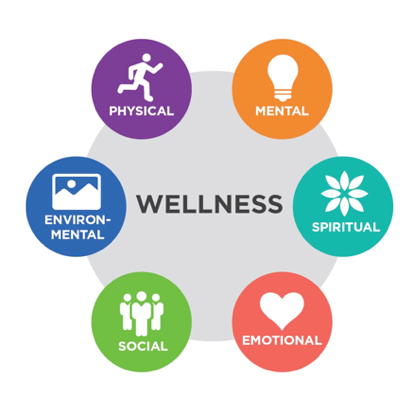
summarize how the components of health are related to wellness. Explore the interconnectedness of physical, mental, emotional, social, and spiritual health and learn how to achieve overall well-being through a holistic approach.
Introduction
Health and wellness are terms that are often used interchangeably, but they refer to different aspects of our overall well-being. Health typically focuses on the physical aspects of the body, including the absence of disease and the maintenance of bodily functions. Wellness, on the other hand, is a broader concept that encompasses not only physical health but also mental, emotional, social, and spiritual well-being. When we summarize how the components of health are related to wellness, we realize that each component plays a vital role in creating a holistic sense of well-being. This understanding reassures us that achieving overall well-being is within our reach as long as we maintain a balance across these components. In this article, we will explore the interconnectedness of these components and how they contribute to overall wellness.
Physical Health
Physical health, often considered the cornerstone of wellness, is a crucial component that supports mental and emotional well-being. It involves maintaining the body through regular exercise, proper nutrition, adequate rest, and avoiding harmful habits such as smoking or excessive alcohol consumption. When the body is in good physical health, it is better equipped to handle stress, resist illness, and recover from injuries. For example, regular physical activity has been shown to reduce symptoms of depression and anxiety, while proper nutrition can enhance cognitive function and mood. Thus, physical health is not only about the absence of disease but also about optimizing the body’s ability to function at its best.
Mental Health
Mental health is another crucial component of wellness, deeply interconnected with physical health. Mental health refers to our cognitive abilities, emotional resilience, and the ability to think clearly, make decisions, and cope with life’s challenges. When we summarize how the components of health are related to wellness, mental health plays a significant role in shaping our overall well-being. A healthy mind enables us to manage stress, build positive relationships, and maintain a sense of purpose and direction in life. Conversely, poor mental health can lead to physical symptoms such as fatigue, headaches, and weakened immune function. Therefore, maintaining mental health is essential for achieving a state of wellness.
Emotional Health
Emotional health, closely linked to both mental and physical health, is a vital component that plays a significant role in achieving balance and harmony in life. It involves understanding, expressing, and managing our emotions in healthy ways. Emotional health also involves developing emotional resilience, or the ability to bounce back from difficult experiences. By nurturing emotional health, we can build stronger relationships, improve our mental health, and enhance our overall quality of life.
Social Health
Social health, which refers to the quality of our relationships with others and our ability to interact with people in a healthy, positive way, is an essential component of wellness. Strong social connections provide emotional support, reduce feelings of loneliness, and create a sense of belonging. When we are socially healthy, we are better able to communicate, resolve conflicts, and build meaningful relationships. Social health also impacts mental and emotional health, as positive social interactions can boost mood, reduce stress, and increase feelings of happiness and satisfaction. Thus, fostering healthy social connections is a critical component of wellness.
Spiritual Health
Spiritual health is often overlooked in discussions of health and wellness, but it is a vital component of overall well-being. Spiritual health involves finding purpose and meaning in life, as well as a sense of connection to something greater than oneself. This can be achieved through religious practices, meditation, mindfulness, or a deep connection to nature. Spiritual health provides a sense of inner peace and fulfillment, which can enhance mental and emotional health. When we summarize how the components of health are related to wellness, spiritual health emerges as a powerful source of resilience and strength. It helps us navigate life’s challenges, find meaning in difficult experiences, and maintain a sense of hope and optimism.

The Interconnectedness of Health Components
The components of health—physical, mental, emotional, social, and spiritual—are deeply interconnected and mutually reinforcing. For example, regular physical activity can improve mental health by reducing symptoms of anxiety and depression, while strong social connections can enhance emotional health by providing support and companionship. Similarly, a sense of purpose and meaning in life can improve mental and emotional health. In contrast, emotional resilience can help us maintain physical health by reducing stress and its negative impact on the body. When we summarize how the components of health are related to wellness, it becomes clear that each component plays a crucial role in creating a holistic sense of well-being. This understanding empowers us to take control of our well-being by adopting a balanced approach to health and wellness. Neglecting one aspect of health can have a ripple effect on others, but by maintaining balance, we can prevent this and achieve lasting wellness.
Integrating the Components of Health
Achieving wellness requires a proactive approach that integrates all components of health. This involves setting goals for physical fitness, mental health, emotional well-being, social connections, and spiritual growth. For example, a wellness plan might include regular exercise, a balanced diet, mindfulness practices, social activities, and time for self-reflection or spiritual growth. By addressing each component of health, we can create a comprehensive wellness plan that supports our overall well-being. When we summarize how the components of health are related to wellness, it becomes clear that a holistic approach is necessary for achieving lasting wellness.
Physical Health and Wellness
While physical health is often the starting point for many wellness plans, it is important to go beyond the basics to achieve true wellness. This involves not only maintaining a healthy weight and preventing disease but also optimizing physical performance, increasing energy levels, and improving overall quality of life. For example, incorporating strength training, flexibility exercises, and mindfulness practices into a fitness routine can enhance physical health and contribute to overall wellness. Additionally, focusing on sleep, hydration, and stress management can further support physical health and create a strong foundation for wellness. When we summarize how the components of health are related to wellness, it becomes clear that physical health is a critical component of overall well-being. Still, it must be integrated with other aspects of health to achieve true wellness.
Mental Health and Wellness
Mental health is a key component of wellness that requires ongoing attention and care. Building resilience, or the ability to cope with stress and bounce back from adversity, is essential for maintaining mental health and achieving wellness. This can be achieved through mindfulness practices, cognitive-behavioral techniques, and developing a positive mindset. Additionally, seeking professional help when needed, such as therapy or counseling, can support mental health and enhance overall well-being. When we summarize how the components of health are related to wellness, mental health emerges as a critical factor in achieving balance and harmony in life. By prioritizing mental health, we can build the resilience needed to navigate life’s challenges and maintain a state of wellness.
Emotional Health and Wellness
Emotional health is closely tied to our ability to understand and manage our emotions, as well as our capacity for empathy and compassion. Cultivating emotional intelligence, or the ability to recognize, understand, and manage our own emotions and the emotions of others, is essential for achieving emotional health and overall wellness. This can be achieved through mindfulness practices, journaling, therapy, and developing healthy communication skills. Additionally, learning to set boundaries, practice self-compassion, and manage stress can further support emotional health. When we summarize how the components of health are related to wellness, emotional health emerges as a key factor in achieving balance and harmony in life. By nurturing emotional health, we can enhance our relationships, improve our mental health, and create a strong foundation for overall well-being.
Social Health and Wellness
Social health is a vital component of wellness that involves building and maintaining healthy relationships with others. Strong social connections provide emotional support, reduce feelings of loneliness, and create a sense of belonging. Building social health requires effort and intentionality, such as reaching out to friends and family, joining social groups, and actively participating in community activities. Additionally, developing healthy communication skills, setting boundaries, and resolving conflicts can further support social health. When we summarize how the components of health are related to wellness, social health stands out as a key factor in achieving overall well-being. By fostering healthy social connections, we can enhance our emotional and mental health and create a strong support system for navigating life’s challenges.
Spiritual Health and Wellness
Spiritual health is an often-overlooked component of wellness that involves finding purpose and meaning in life. Whether through religious practices, meditation, mindfulness, or a deep connection to nature, spiritual health provides a sense of inner peace and fulfillment. It can also provide a source of strength and resilience in times of difficulty, helping us to navigate life’s challenges with grace and perspective. When we summarize how the components of health are related to wellness, spiritual health emerges as a powerful source of well-being that can enhance mental, emotional, and even physical health. By nurturing spiritual health, we can create a sense of purpose and direction in life and achieve a deeper sense of overall well-being.

Conclusion
Achieving wellness requires a holistic approach that integrates all components of health—physical, mental, emotional, social, and spiritual. Each component plays a vital role in creating a balanced and harmonious state of well-being. When we summarize how the components of health are related to wellness, it becomes clear that neglecting one aspect of health can impact others, highlighting the importance of a comprehensive approach to well-being. By addressing each component of health, we can create a wellness plan that supports our overall well-being and achieve a state of wellness that allows us to thrive in all areas of life.





